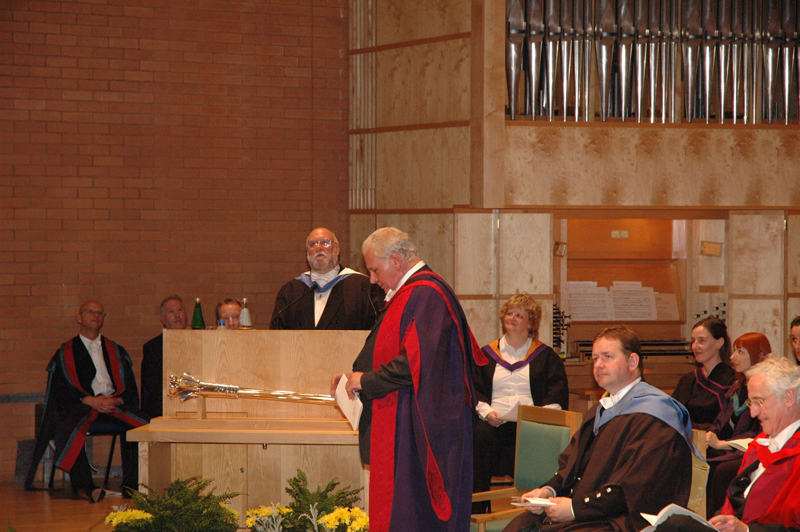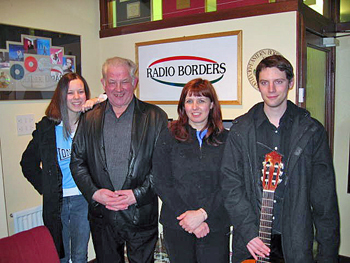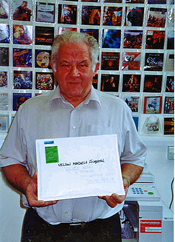Ian Green: the pipes|drums Interview – Part 3
Part 3
pipes|drums: What’s your favourite type of music? What do you listen to in your car that’s not necessarily business related?
Ian Green: Quite an eclectic mixture. I’m a great fan of some of the American singers such as Dean Martin and Nat King Cole. I’ve got many albums by these sort of singers. I also enjoy good country music, provided it’s not that very sentimental sort of country music. I also spend a lot of time listening to traditional music – Scottish, Irish and other world music. I’ve got hundreds of LPs up in my loft, and hundreds of cassettes and now I’ve got hundreds and hundreds of CDs. I just can’t walk past a record shop without buying something. I like good instrumental music, but I suppose my first love is the singer/songwriter; people like Eric Bogle. Song-writing’s such an art. I’d love to be able to write a song myself; I’m fascinated by songwriters.

p|d: Are you involved in the actual engineering or production of Greentrax recordings?
IG: I go to the studio a couple of times when an artist’s there, because I’m interested in what the artist’s doing. But I believe that, if an artist is good, you should allow that ability to come out in the studio and they shouldn’t feel inhibited. So I give them as much control in the studio as I possibly can. There was Brian McNeill’s album “Back o’ The North Wond”, for example, which is an album of songs about people crossing from Britain to America in years gone by. He’d been wanting to do this album for years and when he came to me with the concept and said, “Would you just let me go into the studio and do this?” I said, “Absolutely. You go for it, Brian.” He went into the studio and I went along and listened to some of the stuff going down and I was absolutely thrilled. Brian is a brilliant musician, a brilliant composer and a brilliant songwriter. It’s great to give these sort of people their head and just let their artistic ability shine through. If the artist is very inexperienced then I’ll pay a producer, somebody who has the experience and someone that particular artist or group is likely to get on with. They’ll go into the studio and produce the album and get on with it without too much interference from me.
p|d: You seem to be driven by passion, but is Greentrax financially profitable?
IG: Well, you’re right. There have been many, many times when I or someone else has said … “Why have you done that?” – “You’re not going to make money off that.” That’s not entirely relevant to me. As long as we’re making some money and the company’s keeping its head above water, there are lots of projects that need to be done. They’re there and they should be done. The main thing is to recoup costs and then see about profit margins but making profit on every project is not entirely relevant to me. You’ve got to have albums that are selling to compensate for this approach and we do our best to ensure that every album does go into profit but it is the music that drives me on. I’ve no desire to be a millionaire or even very rich, that just doesn’t interest me at all. I want to earn a comfortable living and ensure all my staff are paid and pay my bills. That’s the important aspects as far as I’m concerned. Every now and again we have an album that does really well and that compensates for some of the ones that are trailing behind.
p|d: Are there any non-Greentrax Celtic music recordings that you wish your company could have made – ones you really admired or thought, “Boy, I wish we could get them.”
IG: There are always artist out there and you think, “I’d like to record them,” and then you find you are a wee bit too late and they have gone to another company. I’ve lost a few really good people by dithering! A good example of that was Wolfestone, a band in Scotland that made quite big inroads into the international music scene. On the other hand, however, we’ve recorded some of the very best people in Scotland. We can’t expect to get everyone. If I had said when I started the Greentrax label 20 years ago, “Who would you like to be on the label, Ian?” – well most of them have finished up on Greentrax: Jean Redpath, Eric Bogle, Dick Gaughan, The McCalmans and now some of the big pipe bands are examples of this.
Part of our problem now is we’ve been successful to the point that lots of people want to join the label and we don’t have the capacity to cope with all the artists who do approach us. Sometimes we just have to say, “No, sorry. We’re too busy at the moment. We just can’t take you on.” We regularly release two albums per month, which is almost too much for the staff and myself. Sometimes I just haven’t been able to say no, especially in the early years. We have always tried so release a fair percentage of albums by artists who don’t have a platform in the wider market, in the hope that we can get these talented people to a wider audience. A good example of that would be Bodega, who won the BBC Radio 2 Young Musicians of the Year Award. We were really in the thick of a lot of releases at that time, but when I heard they had won I thought, “Och, no. We’ve just got to sign this band up and get their music on CD.”
p|d: Who are your favourite artists from the piping and drumming community?
IG: Gordon Duncan was my all-time favourite solo piper, mainly because of the innovative way he played. He could let it rip sometimes and had the ability to control it. Some pipers try to let it rip and it all falls apart but not so with Gordon. He was also a superb tunesmith. I held him in high regard. Gordon Walker is another piper, like Gordon Duncan, who can be very adventurous sometimes. I love his stuff.

Hamish Moore I felt was a superb piper until he had the problem with his finger joints. Unfortunately, Hamish can’t play much these days but I loved his style of piping. Gary West is a lovely Scottish small-pipes player and so is Iain MacInnes – between them they produce the BBC Radio Scotland piping program. At the same time, however, I also admire people like Willie McCallum, Roddy MacLeod and Angus MacColl – top competition pipers. I prefer something just a little bit more relaxed in the player but I have to admit that these pipers are just absolute geniuses in the competition style. They seem to play in competition without a single mistake, which is remarkable.
p|d: What about your vision of the Celtic music recording industry in the future – five, 10, 15 years from now?
IG: That’s a wee bit difficult because it depends if this downloading thing is going to really eat into CD sales. I’d prefer to go on releasing CDs rather than making albums to go straight on to a website to be downloaded That may be direction it’ll take. It will certainly make for a lot less work in some respects, but personally I wouldn’t like to see that. I still get a huge buzz when I get

each new releases in my hand; I get a real kick in seeing the finished article.. I wouldn’t like to see the CD format disappearing and our increased turnover this past year is an indication that maybe CD sales are on the upturn again. I will remain in the company as long as I’m fit to do so. I’ve no desire to retire. People laugh at me when I say this, but it’s my hobby. Coming into the office in the morning isn’t a drudgery. Of course, I get up with a ‘sore head’ sometimes, but on the whole I look forward to every day and I get a big buzz out of what I’m doing.
p|d: And you’ve received a few personal awards this year.
IG: Yes, the awards that have come my way this past year have been out of this world. I was given an award at the Scots Trad Music Awards late in 2005 for Services to Traditional Music, and I was absolutely knocked out by that. And then the Royal Scottish Academy of Music and Drama decided to award me an Honorary Doctorate of Music in 2006 and I could barely believe that this was happening because I so enjoy what I am doing. I never really expected any recognition like that but it’s wonderful when awards do come along.
p|d: What are your plans for Greentrax into the future?
IG: We’ve got a reasonably successful formula here. Like everybody else in the recording business we’ve released things that were below expectations in sales figures and we’ve been left with stock we cannot sell but that’s the nature of the recording industry; we can never change that. But on the other side I am proud of all the albums we have released. We were amongst the first to experiment with the fusion thing which took place in the 1980s – bands like Shooglenifty and Peatbog Fairies. Lots of people told me that was not the way the music should be going but I feel these artists have been very successful in bringing lots of young people into the traditional music scene. You never know, these young people may well go on to experiment with some other aspect of traditional music. Greentrax will carry on doing what we do – a mixture of young unrecorded talent and older and more experienced and well-known artists. I have really good staff at Greentrax and I am very happy with the way things are going at present, with no plans to change anything.


NO COMMENTS YET